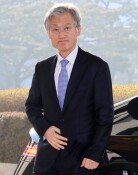Cho Yong-pil`s amiable messages at Tokyo concert
Cho Yong-pil`s amiable messages at Tokyo concert
Posted November. 21, 2013 05:17,
Korean veteran singer Cho Yong-pil told the audience "Gombangwa, ohisashiburi desu ne (Hello, long time no see)" at this concert in Tokyo on November 7. The concert was held in Tokyo in 15 years on the occasion of the release of his songs "Hello" and "Bounce" in Japanese. I was among the fans who were waiting for him for a long time.
I first heard his song in 1981. They were "Red Dragonfly," a fast tempo pop filled with sorrow mood, and "A Woman Outside the Window" that expressed a sad sentiment. I was not the only Japanese charmed by Cho`s singing ability and originality. The following year, he was invited to Asia Music Forum held by Nippon Cultural Broadcasting, and soon after his song "Mia in Memory" in Japanese language became a hit in Japan.
Thirty years from then, we are still with him thanks to the power of popular entertainment served to close gap between Korean and Japanese people.
What was groundbreaking was that Cho for the first time as a Korean singer sang at NHK`s Red and White Singing Contest on December 31, 1987. He sang the song "A Woman Outside the Window" on the stage and released his new song "Five Hundred Years" wearing a white hanbok (Korean traditional costume) in 1988. In 1990, his singing the song "Return to Busan Port" was broadcast live from Lotte World in Seoul. Cho was the only Korean singer to appear at the Red and White Singing Contest for four straight years. He was a pioneer of the Korean Wave boom that would come in the following years.
Followed by the Declaration for Democratization" on June 29, 1987, Korea hosted the 1998 Olympic Games in Seoul, successfully upgrading its international image. This period served as a warm breeze to Cho, or it could be best said that Cho pioneered the stages in Japan and the period followed suit.
He had said, "I am a musician and have nothing to do with politics." But he played his utmost role. For example, "A Woman Outside the Window" was released in 1980 when a tragic incident happened in Gwangju. Professor Song Ho-geun of Seoul National University said, "Who would have imagined that, at a time when no one could console another, that the song starting with a slender violin melody cured the heart of people injured by tragic event. By humming the song, we were able to remember the Gwangju incident and be consoled."(The Dong-A Ilbo, October 26, 2006)
As a reporter, I once covered the mystery behind Cho`s debut song "Return to Busan Port." The Japanese lyrics depict the feelings of a person who is waiting at a port for the lover. The Korean lyrics go like the person waiting for his brother to return. As I mentioned this difference, the singer told me the song was originally a love song.
Lover was changed to brother due to recommendation by a record company. Back then, Korea was promoting a movement of recommending North Korean people living in Japan to return to pay tribute to ancestors` graves. Separated brothers were the object of social attention. The song`s lyrics contained the sorrow of the separation of two Koreas. And finally, Cho held his concert in Pyongyang in 2005.
The Tokyo concert in 15 years was full of friendship. Among the audience was Japanese singer Tanimura Shinji who is his longtime friend since Cho first to Japan. After introducing himself, Cho sang "Oh Friend." While Korea-Japan relations have deteriorated, Cho sent a message that friendship should be forever, which moved my heart.
The timing of the concert that was held in 15 years is also not accidental. In 1988, the late former President Kim Dae-jung came to Japan and declared a Korea-Japan partnership jointly with then Japanese Prime Minister Keizo Obuchi. Back then, the mood was in peak for reconciliation between the two countries. Korea opened its doors for Japanese pop culture thanks to the declaration announced 15 years ago.
Last fall, former Korean Foreign Affairs Minister Han Seung-joo quoted French Prime Minister Georges Clemenceau who had said "War is too important to be left to the generals." On Korea-China-Japan relations, Han said, "It is too important to be left to the political leaders." The sole way to make good Korea-Japan relations is to increase the number of friends mixed with people of both countries in various sectors. Seeing the stage of a Korean big star made me realize this truth.





![[천광암 칼럼]장동혁은 대체 왜 이럴까](https://dimg.donga.com/c/138/175/90/1/wps/NEWS/IMAGE/2026/02/22/133399127.1.jpg)

